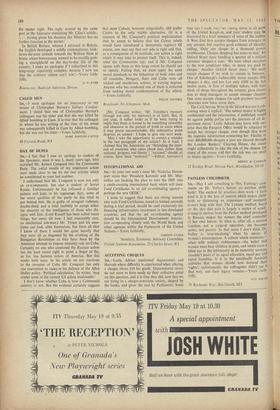SIR,—Leslie Adrian mentioned Aquascutum and Harrods where difficulty is experienced
when offering a cheque above £10 for goods. Departmental stores do not seem to have made up their collective mind on this question, and it is time they did, now that we are living in a cheque-conscious society, shaped by the banks, and giver the seal by Parliament. Some time ago I made inquiries among stores in all part! of the United Kingdom, and your readers may be interested in a brief summary of some of the replies. A West End firm accepts cheques from strangers 10 any amount, but remiires good evidence of identity, adding, Only one cheque in a thousand proves troublesome. Cheque shoppmg has come to stay.' An Oxford Street store handling a quarter of a million customer cheques a year: 'We must adapt ourselves to the new conditions when so many are paid by cheque.' Another Oxford Street store: 'We must accept cheques if we wish to remain in business.' One of Edinburgh's fashioraible stores accepts fifty cheques a day, and has 1,,st only £100 in the last twelve years. A firm of multiple tailors, with hun- dreds of shops throughout the country, gives discre- tion to shop managers to accept stranger cheques, One store accepts cheques for cash payment because clearance now takes seven days. The Civil Service Store in the Strand was not forth- coming when it replied : 'The subject matter is highly confidential and the information, if published, would be against public policy an(' the interests of all de- partment stores.' Leslie Adrian may learn with sur- prise that the Passport Office would be reluctant to accept her stranger cheque, even though they have the requisite information concerning her. Finally, as over 400,000,000 cheques a year are cleared through the London Bankers' Clearing House, the stores ought collectively to take the risk of the cheque, for many of the stores slid that the risk was too small to insure against.—Yours faithfully.
SIDNEY R. CANIP11
22 Erridge Road, Merton Park, Wimbledon, S1V/9






































 Previous page
Previous page